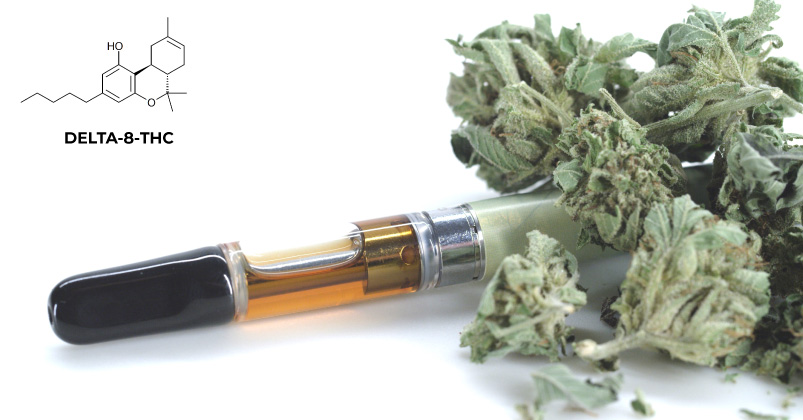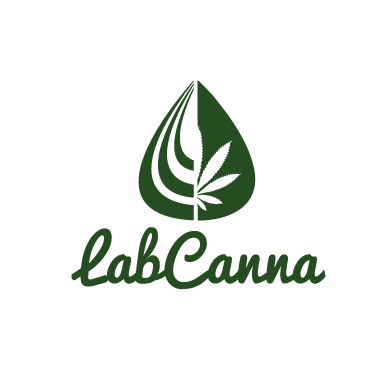Delta-8 THC: 6 Facts You Need To Know

Delta-8-THC
Six facts you need to know about this minor cannabinoid
Delta-8-THC has been growing in popularity over the past couple years. A promising alternative to delta-9-THC, it is described by Dr. David Crocker, board-certified interventional radiologist and the creator of Solutions by Dr. Dave, as “the fourth most common active compound in cannabis. It is closely related to delta-9-THC with anti-nausea, anti-anxiety, appetite-stimulating, pain relieving, and neuroprotective properties. Delta-8 is a kinder, gentler version of delta-9. It possesses many of the same benefits including help with pain, nausea and sleeplessness.”
Is this cannabinoid too good to be true? Here’s what we currently know about the legality and effects of this incredible cannabinoid.
What is Delta-8-THC?
Delta-8 is considered a minor cannabinoid, along with CBG, CBN, and CBC. Like delta-9-THC, delta-8 has been found to interact directly with CB1 and CB2 receptors in our bodies, providing similar effects to the more well-known psychoactive cannabinoid. The main known difference between delta-8 and delta-9 comes down to the location of a few atomic bonds. Even though delta-8-THC only exists naturally in very small amounts, it can also be produced by converting CBD or delta-9-THC by heat, solvents, or altering the PH of the environment.
Is Delta-8-THC legal?
Short answer: yes, in every state besides Alaska, Arizona, Arkansas, Colorado, Delaware, Idaho, Iowa, Mississippi, Montana, Rhode Island and Utah
Long answer: It all depends on how the delta-8 is sourced. As we know, in many parts of the country (including Tennessee), delta-9 remains highly illegal. Since 1970, delta-9-THC has been classified as a Schedule I substance along with heroin and LSD, under U.S. Federal law. If delta-9-THC is chemically converted to delta-8-THC, the delta-8 is considered illegal. If it is converted from CBD from hemp, then it is federally legal due to H.R. 2: The Agricultural Improvement Act of 2018, also known as the 2018 Farm Bill. Under this bill, hemp is defined as “the plant Cannabis sativa L. and any part of that plant, including the seeds thereof and all derivatives, extracts, cannabinoids, isomers, acids, salts, and salts of isomers, whether growing or not, with a delta-9 tetrahydrocannabinol concentration of not more than 0.3 percent on a dry weight basis.” Delta-8-THC is an isomer of CBD, a derivative of hemp and CBD, a cannabinoid found in hemp, and remains legal as long as the final product contains less than 0.3% delta-9-THC.
Will Delta-8 get me high?
Yes. Delta-8-THC is intoxicating, just like delta-9-THC. It is psychoactive and may cause drowsiness and dizziness. Do not use while driving or operating heavy machinery.
There are some subtle differences that users report on the effects of delta-8 and delta-9. Some users describe it as “semi-sedative” without much mental stimulation. Many delta-8 users report that they don’t feel the paranoia, anxiety, or dizziness often associated with delta-9-THC. This may be due to the fact that delta-8 has a lower psychotropic potency, as the difference in molecular structure causes delta-8 to bind differently to CB1 receptors. These receptors play an important part of the endocannabinoid system and regulate most of the psychotropic effects of THC. It may also be possible that delta-8 impacts the other receptors and neural pathways directly.
Is Delta-8 safe?
Delta-8 interacts with the body’s endocannabinoid system and mimics compounds that naturally occur in all vertebrates. It is always important to be mindful and responsible when using delta-8 and delta-9-THC, but the psychoactive effects will wear off within a few hours. THC use may pose some harm to those at risk of developing mental health disorders, pregnant women, and those vulnerable to respiratory problems (if inhaling delta-8). If you have any questions or concerns about adding phytocannabinoids to your lifestyle for medicinal or recreational purposes, it’s always best to speak directly with your physician.
What are the benefits of Delta-8?
Unfortunately, due to the Comprehensive Drug Abuse Prevention and Control Act of 1970, cannabis research has been severely impaired. As of right now, there isn’t much research directly on delta-8-THC. In an interview with Inverse.com, Peter Grinspoon, a primary care physician at Harvard Medical School notes that while delta-8-THC appears to have “vast” potential, limited research has made any health claims extremely speculative. “What we do see about it are little keys to its vast potential, but we don’t really know because there haven’t been that many studies,” Grinspoon says.
Most of what we know about it comes from a 1995 study on children undergoing chemotherapy. In this study, delta-8 oil was administered to eight children, each with different hematologic cancers. This study revealed that delta-8-THC completely prevented the vomiting associated with chemotherapy, with negligible side effects.
In addition to potentially being an effective antiemetic, delta-8 may offer more medicinal benefits than delta-9-THC and other cannabinoids, including more effective pain relief, but these claims have not been further studied in clinical trials as of yet. It’s important to note that delta-8 has been found to be more shelf-stable than delta-9, which may make it a better option for prescription drugs down the road.
Will it show up on a drug test?
Yes, delta-8 contributes to metabolites that will trigger a positive reading on a THC drug test. Cannabis products containing any amount of THC, including any of our full-spectrum hemp products, may result in a positive drug test. If you experience routine drug-testing, it is recommended that you use CBD isolate products instead, which contain zero THC.
While research is still developing on the benefits of delta-8-THC, this cannabinoid appears to offer great promise in a variety of uses. And for those looking to try THC recreationally in states where delta-9 remains illegal, delta-8 is an incredible option. If you’re ready to try delta-8 for yourself, here are the products that we would recommend.
Other Sources:
Leafly: What Is Delta-8-THC and How Is It Different from Delta-9?
Delta-8-THC Promises to Get You High Without the Paranoia or Anxiety
Disclaimer:
No content on this site should ever be used as a substitute for direct medical advice, diagnosis, or treatment from your doctor or other qualified clinician. Always seek the advice of your physician or other qualified health provider with any questions you may have regarding a medical condition.
